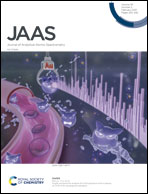A modified genetic algorithm optimized SVM for rapid classification of tea leaves using laser-induced breakdown spectroscopy
Abstract
To improve the accuracy of laser-induced breakdown spectroscopy (LIBS) in the classification of tea leaves, a modified adaptive mutation probability for genetic algorithm (GA) was proposed to optimize support vector machines (SVM). The implementation process of the GA-SVM algorithm was discussed, and the key parameters were analyzed. The penalty factor and kernel function parameters in SVM were optimized by GA. The spectral line intensities of Mg (279.55 nm), Mn (279.83 nm), Mg (280.27 nm), CN (0–0) (388.34 nm), Ca (393.37 nm), Al (396.15 nm), Ca (396.84 nm), C2 (0–0) (516.45 nm), Fe (517.46 nm) and K (766.49 nm) compared to C (247.86 nm) were selected as the analysis indexes according to the differences of LIBS spectra. LIBS spectra pre-processed by multiple scattering correction (MSC) with the optimal input feature were used to construct the GA-SVM model for different tea species. The results showed that the average correct classification rate was 99.73% in the training set. In addition, the average accuracy was 98.40% in the test set. The classification accuracy of the improved GA-optimized SVM was obviously higher than that of cross validation-support vector machine (CV-SVM) and particle swarm optimization-support vector machine (PSO-SVM). This work demonstrates that the GA-SVM can avoid the blindness of parameter selection and can effectively increase the accuracy of tea classification. The results indicated that LIBS is an effective technology in identificating tea leaves; moreover, it has a real-time, rapid and reliable measurement prospect.



 Please wait while we load your content...
Please wait while we load your content...